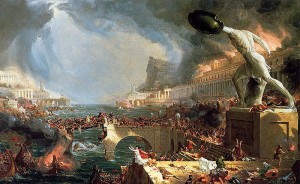In the Melian dialogue, the Athenians have sent a military force to the city of Melos. The Athenians urge the Melians to submit. If they don’t, the men will be killed, the children and women taken for slaves. The Athenians say, “The strong do as they will, and the weak suffer what they must.”
In other words, “Take the deal, or you’ll get even worse.”
This is, in essence, what Putin said to Ukraine, and Ukraine, like the Melians, refused. It is at the heart of most of US interactions with “enemy” nations since WWII, and especially since the end of the Cold War. Even if they didn’t promise destruction, enemies were told, “Resist, and we’ll destroy your economy with sanctions, and millions will suffer or die.”
There are two corollaries to this, however. The first is pointed out by the Melians:
But do you not recognise another danger? For, once more, since you drive us from the plea of justice and press upon us your doctrine of expediency, we must show you what is for our interest, and, if it be for yours also, may hope to convince you: Will you not be making enemies of all who are now neutrals? When they see how you are treating us they will expect you some day to turn against them; and if so, are you not strengthening the enemies whom you already have, and bringing upon you others who, if they could help, would never dream of being your enemies at all?
This is what the US did to many countries — these countries may not have declared their enmity, but they do not consider the US a friend. They view the US as a threat, and when the day comes that they can get their revenge, they will do so.
It is at the heart of what is happening in Europe: Rearmament. By using his military, Putin has convinced other nations, especially Germany, to rearm.
But there is a third side, mentioned by neither the Melians nor the Athenians.
“If the powerful can do this, if I do not do it, I am not powerful.”
A great deal of why Russia is doing what it is, and why it created all the little semi-states around itself, was in reaction to the US. “If the US can violate international law, create Kosovo, and go to war with other nations who are weaker than it, if we don’t, we admit we are not powerful.”
Powerful nations can violate international law. If Russia does not violate international law in the same ways as the US and its favored vassal states does, then Russia is admitting it is weak.
The massive sanctions response is a test. Is the West still strong enough to largely limit massive violations of international law to itself and its vassals, or is Russia capable of withstanding those sanctions, and therefore one of the strong?
This question has yet to be answered. It will take time. In large part, as I have pointed out repeatedly, it depends on China. Probably Russia isn’t strong enough; but China + Russia are.
And notice the key allies who are sitting this out: Israel, three of the four Gulf states, the Saudis, and to a large extent, Turkey.
“There is no difference to us between Ukraine and Iraq or various other violations of international law. We aren’t your allies because we are your friends.”
Meanwhile, the US is asking China, their declared #1 enemy for the past twelve years or so, to undercut Russia, because the real question isn’t about Russia, it is about China.
“The strong do as they will, and the weak suffer what they must.” Who are the strong in our world?

